Built on a hilly 40 acres, surrounded by trees, grass, and native plants, the Utah State Capitol in Salt Lake City is absolutely gorgeous! Here are ten things to note when you visit…
For 20 years after statehood, the leaders of Utah operated out of borrowed spaces. But, when railroad executive Edward Harriman died in 1909, the state collected nearly $800,000 in inheritance tax that seeded the funding of the Utah State Capitol.
Here are ten things to note when you visit the Utah State Capitol:
1 – The Utah State Capitol is Constructed from Granite Mined from Nearby Little Cottonwood Canyon
When the building was under construction, a dedicated railroad was built to haul granite from the quarry to the construction site.
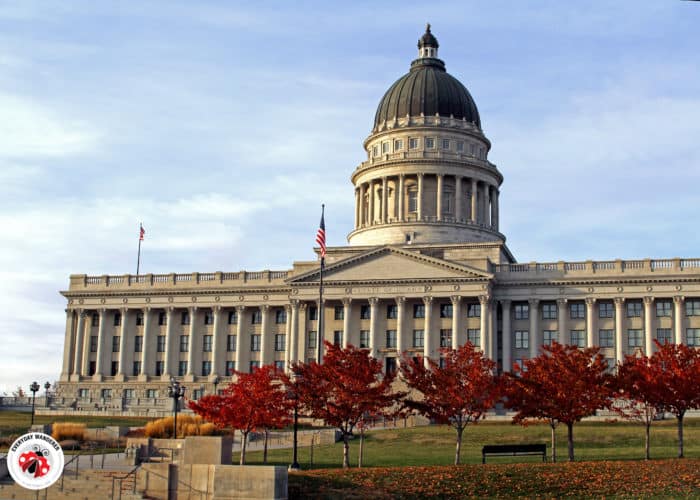
Fun Fact: Other Salt Lake City landmarks built from Utah granite include the Salt Lake Temple and LDS Conference Center.
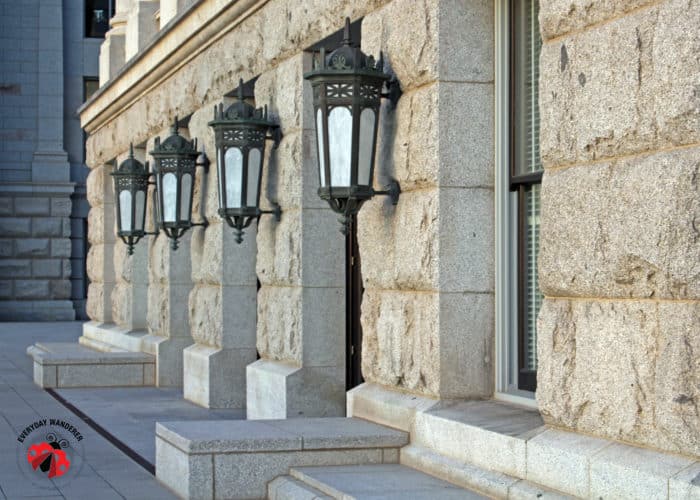
2 – The Utah State Capitol Offers Amazing Views
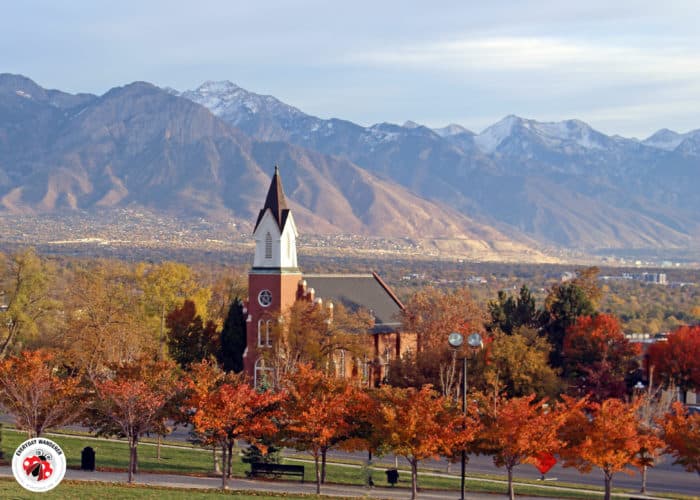
Pro Tip: Complimentary tours of the Utah State Capitol are offered hourly at the top of the hour from 9:00 am to 4:00 pm, Monday through Friday. But, the building is open to the public from 7:00 am to 8:00 pm on weekdays and 8:00 am to 6:00 pm on weekends and holidays. These hours make it easy for someone like me to fit in a visit around my day job.
3 – The Utah State Capitol is Made with a Mix of Marble
Although the Capitol Commission wanted to construct the building out of local materials, fiscal realities forced them to occasionally supplement with out-of-state products. The main floor’s columns, walls, and staircases all feature Georgia marble. The rest of the building, including the House of Representatives, the Supreme Court, and the State Reception Room, feature birdseye marble from Utah County.
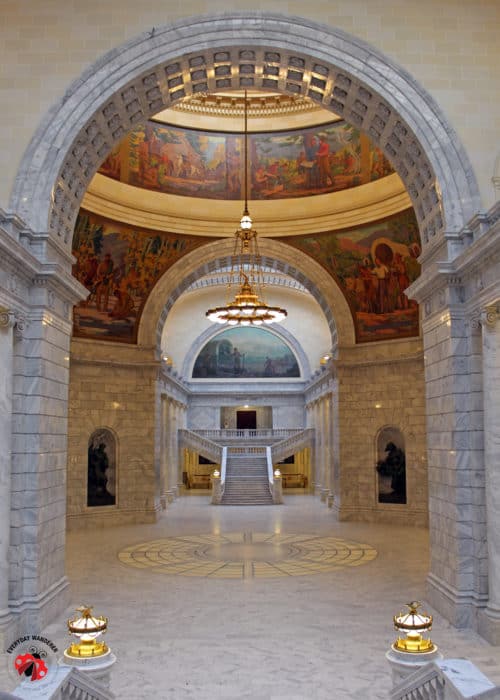
4 – Don’t Miss the Niche Statues Inside the Capitol
The four niche statues directly under the Capitol’s dome are dedicated to the timeless beliefs of the people of Utah:
- Immigration & Settlement
- Land & Community
- Science & Technology
- Arts & Education
Each sculpture features an adult figure mentoring a younger prodigy. In the Immigration & Settlement statue, the woman barely touches the girl’s shoulder giving her loving encouragement but allowing her to choose her own path forward.
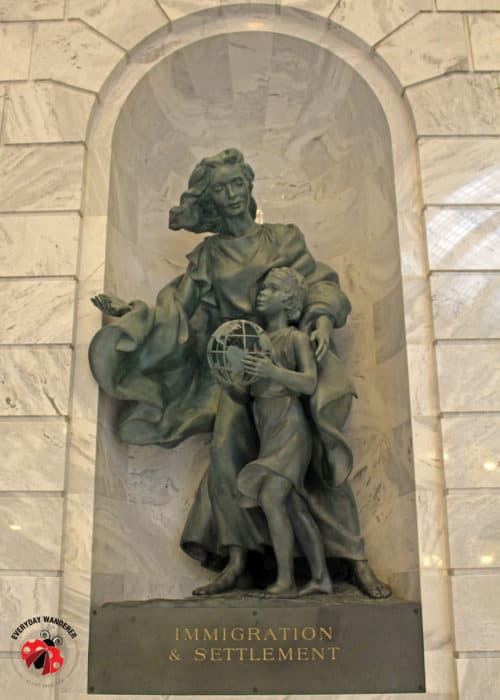
Pro Tip: Have a scavenger hunt in the Utah State Capitol with this guide. Hint: The photo above is one of the things you need to find!
5 – The Utah State Capitol Uses Natural Light to Its Fullest
Like the Salt Lake City Public Library, the Capitol harnesses natural light to reduce the use of electricity. While the library uses a curved wall of windows, the architect who designed the Capitol used arched skylights.
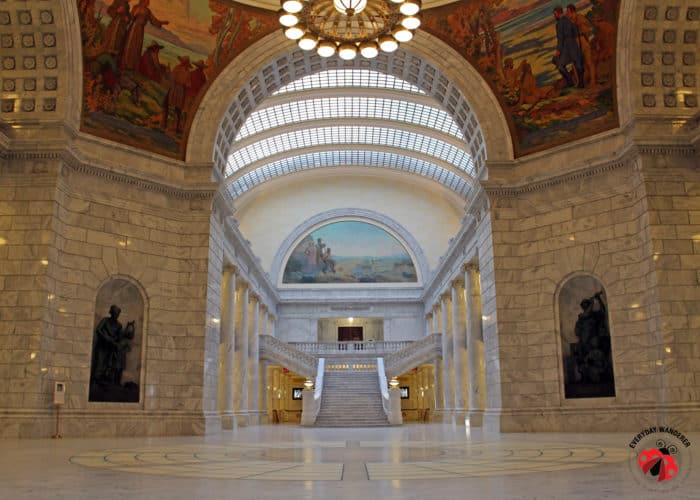
6 – Utah is Known as the Beehive State
As a nod to the hard work and cooperation that takes place in a beehive, Utah adopted the nickname The Beehive State. Utah incorporated a beehive into its state seal, and copper beehive sculptures are prominently displayed on the main staircase outside the Capitol.
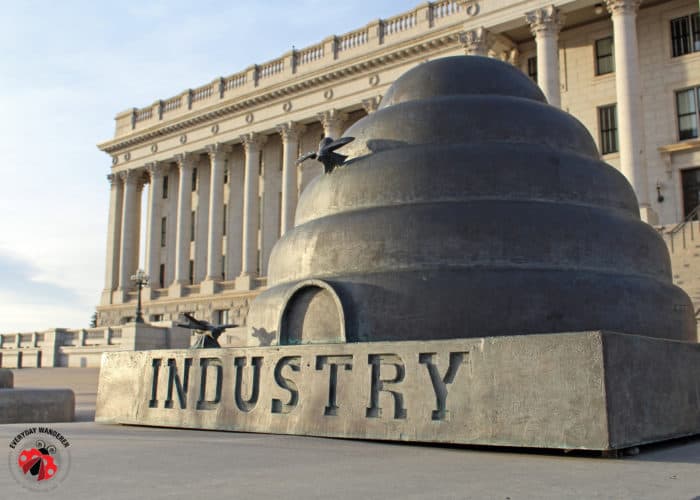
Fun Fact: Probably not surprising, the Utah state insect is the honeybee.
7 – A Nod to the Inventor of the Television
Credited as the inventor of the television, Philo Farnsworth was born in a log cabin near Beaver, Utah and raised predominantly in Idaho. After attending college in Utah, Farnsworth spent most of his career away from his birth state. In California, Pennsylvania, and Germany he secured more than 150 US and foreign patents for his inventions.
These details are important because a similar statue to the one standing in the Utah State Capitol is in the National Statuary Hall in the US Capitol. The Statuary Hall includes two statues of important figures from each state that represent its history. Recently, a Utah legislator proposed replacing Farnsworth’s statue with one of Martha Hughes Cannon. Keep reading for more on her…
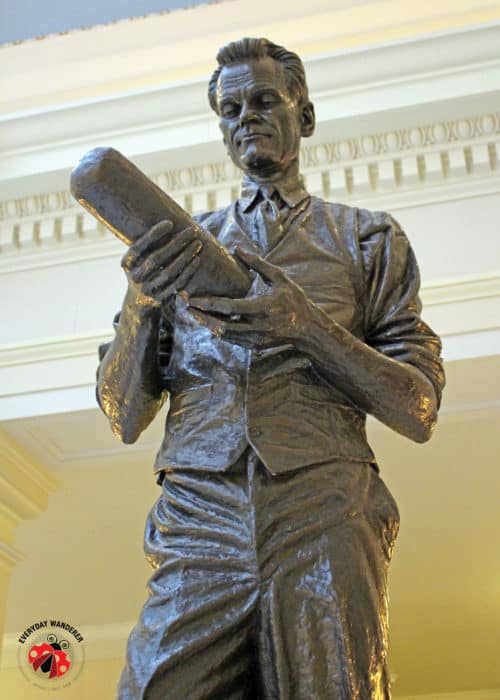
8 – Honorable Lions
Sculpted from Italian marble, two pairs of lions guard the east and west entrances of the Utah State Capitol. Each lion represents a different age of life and has an honorable name: Fortitude, Integrity, Honor, and Patience.
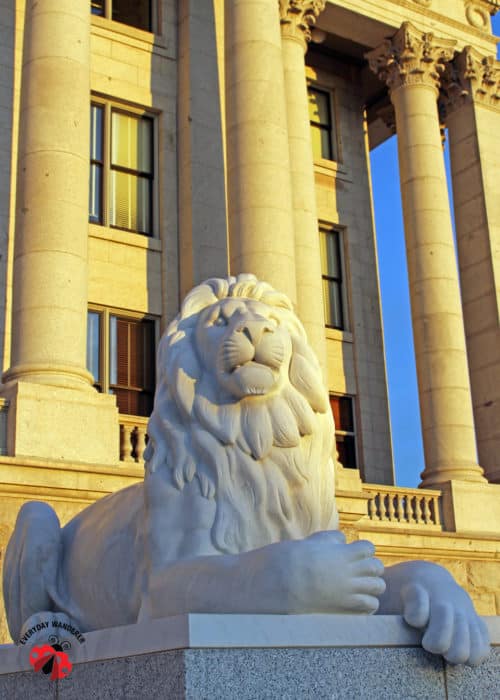
9 – Abe Lincoln Statue
Born in South Dakota and educated at the Art Institute of Chicago, sculptor Gilbert Riswold moved with his family to Salt Lake City in August 1926. During the five years that he lived in Utah, he worked on his most famous piece dedicated to the 500 Mormons who joined the US Army during the Mexican War.
His bronze bust of Abraham Lincoln is located on the 4th floor of the Utah State Capitol where it is clearly good luck to rub his nose.
10 – Relegated to the Back of the Building
Behind the Capitol stands a sculpture of Martha Hughes Cannon. A physician, suffragist, and women’s rights advocate, Dr. Cannon was the first female state senator elected in the US. At a time when most women couldn’t even cast a vote, Dr. Cannon defeated her own husband to win her state senate seat.
Fun Fact: Although the Utah territory granted women the right to vote in 1870, Congress revoked that right in 1887. Voting rights for the women of Utah were restored in 1895 through the state’s constitution. But elsewhere in the US, women weren’t granted the right to vote until August 1920 when the 19th Amendment was ratified.
After learning more about Dr. Cannon and her contributions to the state of Utah, I certainly respect and appreciate Adam Gardiner’s efforts to replace Farnsworth’s statue in DC’s National Statuary Hall with one of Dr. Cannon. According to the Salt Lake Tribune, there are two requirements for replacing a statue in the National Statuary Hall:
- The governor must sign a resolution for replacement
- The statue has been on display in the State’s Capitol for at least ten years. (The bronze statue of Dr. Cannon was dedicated in 1996.)
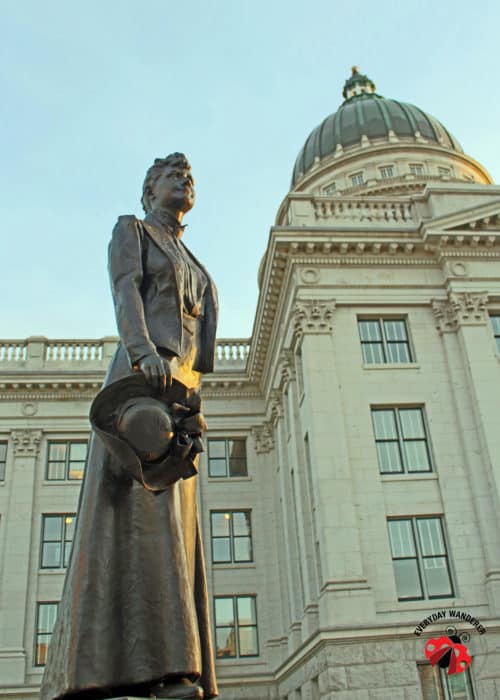
Have You Visited the Utah State Capitol in Salt Lake City?
Did you take a tour or explore on your own? What did you do and see? Anything you’d add to this list? Share your experience in the comments section below.
More Information and Inspiration for Visiting Salt Lake City
- With more numbers and cardinal directions than names, it can be hard to find your way around Utah’s capital city. This secret decoder ring will help you navigate Salt Lake City street addresses.
- Now that you know how to navigate Salt Lake City street addresses, here are nine things to do in Salt Lake City.
- Start your day right by eating at one of the best restaurants for breakfast in Salt Lake City.
- Explore more of Salt Lake City with this interactive scavenger hunt that starts on the steps of the Utah State Capitol.
- Attracting approximately five million visitors a year, Salt Lake City’s Temple Square is the most popular destination in Utah. And adjacent to Temple Square is the Beehive House, the home that Brigham Young built for his large family.
- Although it’s been several years since Salt Lake City hosted the 2002 Winter Olympics, these nine activities will help you keep the Olympic flame burning.
- Just a short drive from Salt Lake City, Antelope Island State Park is on the Great Salt Lake’s biggest island. Visit for hikes with amazing scenery and to catch a glimpse of one of the largest and oldest publicly-owned bison herds in the country.
- Liquor laws in the Beehive State are some of the most restrictive in the country. Here’s what you need to know before drinking in Utah.
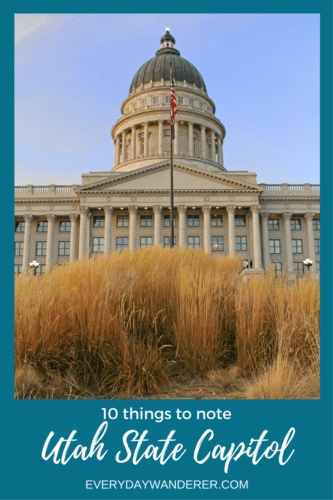




I’m hoping to get to Utah to visit some National parks this year. I’ve never been to the capital building, but after seeing this it looks pretty interesting. Maybe I’ll give it a try! I really appreciate the fun facts and pro tips ?